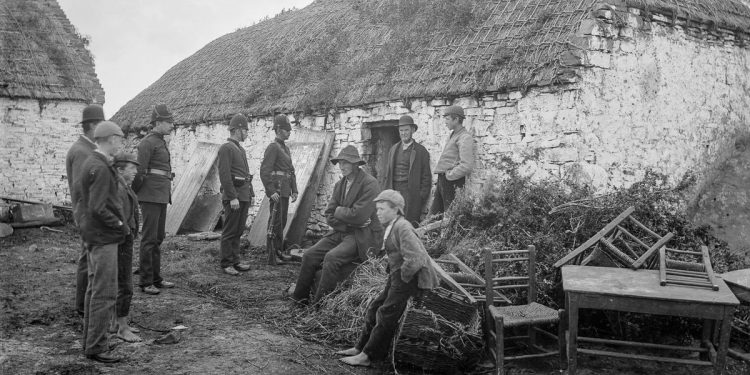On the face of it, the Covid-19 pandemic has little in common with the Potato Famine that devastated the Irish population in the 1840s.
One involved a disease that attacked the leaves and tuber of the potato plant, and that somehow led to the decimation of the people of a small island clinging to the western edge of Europe.
The other is a virus that affects lungs and airways, has so far killed tens of thousands of people globally, with the final death toll likely to be much, much higher, and wrought havoc with the world’s economies.
However, there are some parallels that we can draw between these two seismic events.
The potato blight of the mid-19th century is remembered in the history books as a uniquely Irish tragedy, but the blight itself, like Covid-19, was actually a global phenomenon.
The potato, brought to Europe from the New World of the Americas, was found to be a hardy, versatile vegetable that could be produced in pretty much any climate and quickly became a staple crop across northern Europe.
So when the blight, which had already wrecked crops in Mexico and the United States, arrived in Europe, it devastated the potato yield across the continent.
Just as Irish tenant farmers were waking up to find the potato tubers rotting in the ground, farmers in Belgium, Holland and France were facing the same scenes.
Different food systems meant the blight did not devastate Belgium, Holland and France
So then why did the blight cause such devastation to Ireland; and why was that devastation not in the history of these other nations?
The answer speaks to two of the aspects of the Covid-19 crisis that we have all been watching unfold these past months. The first is poverty.
Imposing poverty
In the 18th century much of Ireland was owned by an aristocracy of English and Anglo-Irish landlords, many of whom were absent while their families had held on to these vast estates for centuries.
Much of these great estates were rented out in small parcels of land to the indigenous Irish population; a single field might have strips of land allotted to many Irish families, all toiling to eke out a subsistence living.
It was an economical model that worked for no one. The poor Irish struggled to survive the year, looking to yield enough of a crop that would feed their family, pay their rent to the landlord’s agent and allow them enough to trade or pay for a few essentials like a small amount of meat and other vegetables.
The poorest are dying of Covid-19 at twice the rate of the richest
For their Anglo-Irish overlords, this low level, subsistence farming was a highly ineffective for the delivery of income or in terms of developing a more efficient, sustainable estate.
As a crop, the potato was well suited to Ireland’s cold, wet, changeable climate and damp soil.
And, fatally, a farmer could produce two crops of potato in a single year. Because of this, these poor Irish peasants became almost wholly dependent on the potato for their subsistence survival; a terrible situation to be in when the blight hit.
Those farmers in other countries suffered hardship when their potato crop failed, but they had other crops and livestock to keep them going.
No one knows exactly how many Irish died in the famine. One million is a conservative estimate; too many to get proper burials, or to be accurately counted.
The Government sought to protect the free market over human lives
The blight on the potato did not kill them; it was starvation and the accompanying diseases like typhus that did the job.
Poverty killed them.
And while the media and politicians of today talk about the Covid-19 pandemic as being the great leveller, affecting all of us equally, the reality is starker.
Research from the Office of National Statistics found that people living in the poorest parts of England and Wales are dying of the virus at twice the rate of those in the richest areas.
How governments respond
The second lesson of the Famine for us, this Covid-19 generation, is about the importance of how governments respond to a major crisis
During the potato blight, other crops grown in Ireland were unaffected.
And, while Irish peasants starved along the back roads or died in ditches, the town’s shops had an overabundance of produce for sale and exports of foods, including livestock, butter, peas and beans, actually increased during the famine years.
The government imported inadequate supplies of cheap maize from America while still allowing food to be exported. They provided a bare minimum of support, from soup kitchens and poor houses for the most destitute to public works programmes, and on the whole insisting that the landlords should bear the greater responsibility for their tenants.
However, many of the absent landlords had been in debt before the blight. Now they had lost the small income they received from their tenant farmers. Many turfed the farmers and families out of their homes and pulled in the roofs to stop them returning, perhaps seeing the famine as an opportunity to develop their land into larger, more profitable holdings. The National Library of Ireland has a startling photographic record of these evictions.
The British government’s attitude to the Irish famine is still a cause for debate.
Most historians would agree that the worst outcomes of the famine could have been avoided if the government had the political will to prevent them.
Arguments continue about whether that behaviour was borne out of ignorance, incompetence or inertia. Or it was developed from malice, fed by anti-Irish and anti-Catholic sentiment.
Some historians maintain it was a deliberate policy of laissez faire; that it was more important for the Government of the day to protect the free market economy than save human lives.
Whatever the reasons, their collective inaction and inadequate response made a major contribution to the death toll.























